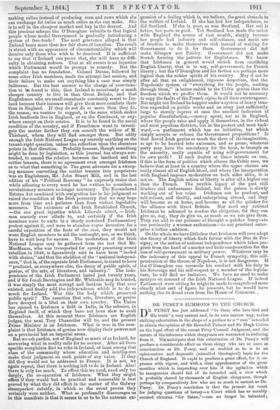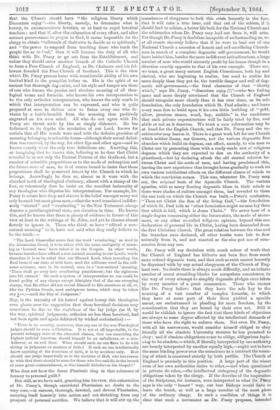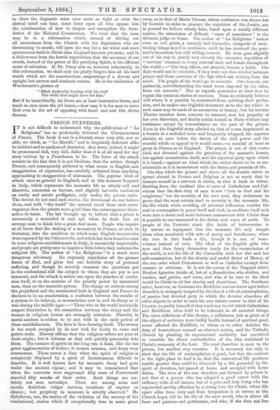DR. PUSEY'S SUMMONS TO THE CHURCH. D it. PUSEY has just
addressed "to those who love God and His truth" a very earnest and, in its own narrow way, rather striking exhortation in the shape of a preface to a "cam" intended to obtain the opinion of Sir Roundell Palmer and Sir Hugh Cairns on the legal effect of the recent Privy Council Judgment, and the nature of the inference which clergymen are warranted in deducing from it. We anticipate that this exhortation of Dr. Pusey's will produce a considerable effect on those clergy who are at once as conscientious as Dr. Pusey, and as wedded as he is to an opinionative and dogmatic (miscalled theological) basis for the Church of England. It ought to produce a great effect, for it ex- presses with vigour, and with a clear apprehension of the great sacrifice which is impending over him if the agitation which he inaugurates should fail of its intended end, a view which is probably shared by thousands of English clergymen, though perhaps by comparatively few who are so much in earnest as Dr. Pusey. Dr. Pusey's conviction is that the present lay court for judging questions of heresy—a Court which has so notably secured victories "for Satan,"—can no longer be tolerated; that the Church should have "the religious liberty which Dissenters enjoy"—the liberty, namely, to determine what is heresy, to excommunicate heretics, or at least to expel heretical teachers; and that if, after the exhaustion of every effort, and after earnest perseverance in prayer to God, it seems impossible for the clergy to obtain "tribunals of their own to decide as to spirituals," and "the power to suspend from teaching those who teach the people lies as to God," then it will become the duty of all who think with Dr. Posey to go out from the Establishment, and unless they should enter another branch of the Catholic Church to form a Free Church of England, as Dr. Chalmers and his fol- lowers founded the Free Church of Scotland. This is the view which Dr. Pusey presses home with considerable ability of his own limited kind in the pamphlet before us. His is the spirit of an earnest but thorough dogmatist, and his style and temper are those of one who knows the precise and absolute meaning of all theo- logical terms and formulm, who knows his own interpretation to be the only orthodox interpretation, who knows the only words in which that interpretation can be expressed, and who is quite prepared at once to deliver over to Satan every one who de- viates by a hair's-breadth from the meaning thus positively engraved on he own mind. All who do not agree with Dr. Pusey are thrust aside by him as simply dishonest. lie has fathomed to its depths the revelation of our Lord, knows for certain that all His words were used with the definite precision of meaning belonging to scientific terms—although their actual defini- tion was reserved, by the way, for other lips and other ages—and he knows exactly what the only true definitions are. Knowing this, or imagining that he knows this, believing as he does that Christ revealed to us not only the Eternal Persons of the Godhead, but a number of scientific propositions as to the mode of redemption and the future state of man, he is of coarse bound to insist that those propositions shall be preserved intact by the Church to which he belongs. Accordingly he does so, almost as it were with the clenched teeth of theological obstinacy, almost with a stamp of the foot, so vehemently does he insist on the manifest insincerity of any theologian who disputes his interpretations. For example, Dr. Pusey is aware how deep and sincere is the belief amongst many not only learned but most pious men,—that the word translated indiffer- ently "eternal" and " everlasting " in the New Testament always denotes a peculiar spiritual state, not duration in time. He knows this, and he knows that there is plenty of evidence in favour of this view at least in the writings of St. John, and yet he chooses almost fiercely to ignore it. Those who think so have "affixed a non- natural meaning" to it, have not said what they really believe to be the truth :— " The Lord Chancellor avers that the word everlasting,' as used in the Athanasio.n Creed, is to be taken with the same ambiguity of mean-
ing learned men' have taken it in the Gospels. In other words, because heretics have affixed a non-natural meaning to our Lord's words therefore it is to be ruled that our Blessed Lord, when revealing the final issue of our stato of trial here, used the selfsame word in the self- same sentence, once in its natural, once in a non-natural 'meaning. These shall go away into everlasting punishment; but the righteous into life eternal.' On such a system of interpretation no one could be found guilty of any charge except Almighty God of the one sweeping charge, that He either did not reveal Himself to His creatures at all, or, like the Pythian Oracle, used ambiguous terms, which may be taken any how,—until the Day of Judgment."
Nay, in the intensity of his hatred against heresy this theologian even gloats over the suggestion that these heretical decisions may sometimes be due to the sinfulness of the lay judge (as if, by the way, spiritual judgments, orthodox no less than heretical, had not been again and again delivered by wicked ecclesiastics) :— " There is no security, moreover, that any one of the non-Theological judges should be oven a Christian. It is not at all improbable, in the present unhappy state of the educated classes, that one exorcising the highest judicial functions should himself be an unbeliever, or a mis- believer, or an evil liver. What should such an one have to do with sitting in judgment on matters of faith ? If such an one intellectually know anything of the doctrines of faith, it is by accident only. How should one judge impartially as to the doctrine of Hell, who has reason to wish that there should be none for those who live and die in the breach of some great commandment, or who himself disbelieves the Gospel?'
Who does not hear the fierce Pharisaic ring in that reference of hersesy to personal guilt?
But still, as-we have said, granting him his view, this exhortation of Dr. Pusey's, though sacerdotal Pharisaism no doubt to the -very core,—is earnest, thorough, devoted, and devout Phaxisaism, carrying itself honestly into action and not shrinking from any prospect of personal sacrifice. We believe that it will stir up the
consciences of clergymen to look this crisis honestly in the face, that it will raise a true issue, and that out of the schism, if it should lead to schism, a better life both for the National Church and the schismatics whom Dr. Pusey may lead out from it, will arise.
For though Dr. Pusey is doubtless incapable of understanding us, we at all events sincerely believe that if he were to lead out of our National Church a secession of honest and self-sacrificing Church- men in search of a complete dogmatic self-government,'he would leave behind him, besides the mere indifferent latitudinarians, a large number of men who would sincerely profit by his lesson though in a direction exactly opposite to that of his own example. There are, we trust, a great many earnest English Churchmen, both lay and clerical, who are beginning to realize, but need to realize far more deeply than they yet do, the terrible danger and evil of dog- matic self-government,--the fatal character of that 4' liberty
which," says Dr. Pusey, "dissenters enjoy (?)"—who flare feeling
more and more deeply convinced that the Church of England should recognize more clearly than it has ever done, as its sole foundation, the only foundation which St. Paul admits ; and -leave every man free to build upon it his own little building of "gold, silver, precious stones, wood, hay, stubble," in the confidence
that such private superstructure will be fairly tried by fire, and
abide or not as it deserves. We trust a new reformation may be at band for the English Church, and that Dr. Pusey and the re- actionaries may hasten it. There is a great work left for our Church which neither Rome, nor Geneva, nor the various dogmatic free churches which build on dogmas, can effect, namely, to win men to Christ -not by presenting them with a ready-made suit of religious dogmas which they are expected to don on the authority of a priesthood,—but by declaring afresh the old eternal relation be- tween 'Christ and the souls of men, and having proclaimed this, leaving the new experience thus brought home gradually to work its own various intellectual effects on the different classes of minds to which the conviction comes. This was, whatever Dr. Pusey may
say, the oriyinal basis of the Apostolic Church. The various apostles, with as many floating dogmatic ideas in their minds as
there were shades of culture amongst them, had revealed to them the one rock on which the Church was built,—Peter's confession, "Thou art Christ the Son of the living God,"—the foundation of which St. Paul tells us "other foundation might no man lay than 'that which is laid, which is Jesus Christ." We never hear of a single dogma concerning either the future state, the mode of atone- ment, or any other so-called religious opinion, beyond this one declaration of personal life in Christ, having been demanded from the first Christian Church. The great relation between the vine and
the branches once declared, all other truths were left to flow naturally from it, and not exacted as the sine qua non of com- munion from any one.
Dr. Pusey will say doubtless with much colour of truth that the Church of England has hitherto not been free from much more refined dogmatic tests, and that such as exist cannot honestly be dispensed with by any actual clergyman of the Church of Eng- land now. No doubt there is always much difficulty, and an infinite number of moral stumbling-blocks for scrupulous consciences, in the way of every attempt to simplify dogmatic pledges once taken by every member of a great communion. Those who cannot like Dr. Pusey believe that they have the sole key to the meaning of a vast number of complex formulae, to which they have at some part of their lives yielded a specific assent, are embarrasssed in pleading for more freedom, by the consideration that they are bound by their own act. Still it would be childish to ignore the fact that these kinds of objections are always to some degree affected by the intellectual demands of those who have the right to enforce them. Not even Dr. Pusey, with all his narrowness, would consider himself obliged to obey literally all the obsolete University statutes he has promised to
obey ; and if obsolete obligations cease to oblige, obligations begin- ning to be obsolete,—which, if literally interpreted by one authority are loosely interpreted by another equally high,—ought not to have the same binding power over the conscience as a contract the mean- ing of which is construed strictly by both parties. The Church of England is precisely in this position. A large part of the wisest even of her own authorities desire to relax,—and when questioned
in private do relax,—the intellectual stringency of the dogmatic obligations taken by the clergy. If the doctrine of the inspiration of the Scriptures, for instance, were interpreted in what Dr. Parley says is the only "honest" way, our best Bishops would have to leave the bench, as well as a large number of the most pious of the ordinary clergy. In such a condition of things it is clear that such a movement as Dr. Pusey proposes, intended to draw the dogmatic reins once more as tight as even the clerical mind can bear, must force upon all who oppose him the consideration of how to deepen and strengthen the foun- dation of the National Communion. We trust that the issue may be in a reformation which, instead of driving out all earnestness from the Church with the dogmatists who are threatening to secede, will open the way for a far wider and more spontaneous faith in Christ than England has ever yet seen; and in a deliverance from the horrid superstition that the accuracy of our creeds, instead of the power of His purifying Spirit, is the efficient cause of salvation. If Dr. Pusey aids us, however reluctantly, in this reformation, we shall only too gladly forgive him all his hard words which are the conscientious outpourings of a devout and upright but narrow and obstinate nature. He is the realization of Wordsworth's picture of "Blind Authority beating with his staff The child that might have led him."
-But if he beats blindly, his blows are at least instructive blows, and teach us once more the old lesson,—how easy it is for men to serve God even in the act of opposing with heart and soul His divine decrees.
































 Previous page
Previous page